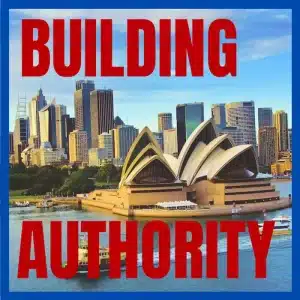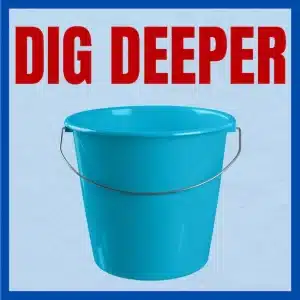If you had an information product that you wanted to sell online, how would you do that?
In the previous post, I shared the two essentials of the ultimate product sales video.
This presumes two things. First with more people watching more videos your sales process must include a sales video. Second, you need to include those two essentials in your video. They’re the key concepts and key ingredients that will drive your sales message.
Without them, you won’t motivate your potential buyers to act. And this means they won’t buy from you. And this means you won’t make any money from your content.
The Two Things Every Great Chef Needs
But randomly sharing this is not a good sales process. It’ll just come across as noise – blah, blah, blah, blah, blah.
That’s like a chef closing his eyes and throwing all of his ingredients into the mixing bowl at the same time. That’s not going to work. If you don’t put all the ingredients together in the right order, you won’t finish up with the result you want.
To sell your products you need to arrange this content into a coherent story to lead your potential client to their buying decision. The previous post gave you the key ingredients and this video gives you the steps you need to take to put it all together. If you haven’t already you might want to go back and read the previous post to create your essential ingredients.
Your Sales Process and Learning Styles
Imagine that you had to stand up in front of a group of people and teach them something. You might already do this as a teacher, a trainer, a sales manager, a keynote speaker or if you’re making videos on YouTube like me.
The biggest mistake you can make in trying to teach others is presuming that they learn just like you. They might, but they also might not. If you don’t share your ideas in ways that appeal to other people’s learning styles, then they’re going to lose interest and not learn much at all.
The same applies to your sales process. If they’re not engaged in your sales process, they won’t buy from you.
TIP: If you’re not selling as much of your products or services as you would like it might be that you’re not speaking to the learning styles of your potential buyers.
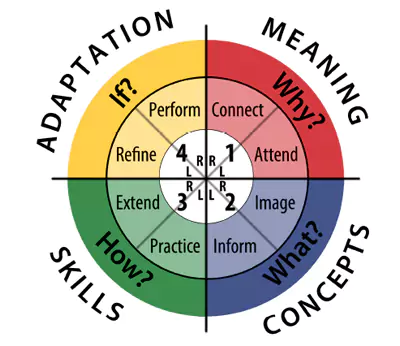
The 4-Mat Model for Sales
The framework I use for my sales process was originally developed for school teachers. The 4-Mat model by Bernice McCarthy is a great tool for a sales process because it addresses the four main styles of motivation.
In your sales process, your goal is to have your potential buyers take action. Ideally, you want them to take the action of buying your product. To do this you need to motivate them to act. And the key to a good sales process is to take your potential buyer through each motivation stage or style so you can appeal to more people.
Here’s how I use the 4-Mat model as the structure of my sales process.
 1 Why should you care?
1 Why should you care?
To be able to sell anything you must first attract the attention of your potential buyers. And this means answering the question: Why? Why should your audience care?
In the Why Quadrant, you want to talk about this at the global or big-picture level (not at the product level) – and you want to address both sides of the problem and the solution. This is The Gap we talked about in the previous post – You are here and you’re dealing with this problem, and you want to be here instead with the problem resolved.
For example, with my Book Rapper book summaries, I could ask the question:
Are you falling behind? Are you making poor decisions? “OMG, I don’t want that to happen.” Instead of being uninformed and making poor decisions, you want to be informed and make smart decisions. To be informed you need to learn about what is going on in the world.
 2 What is Your Product Solution?
2 What is Your Product Solution?
That’s a good general solution, but how do you do that specifically? How would you act on this today? This is what you want to answer in the What Quadrant – You want to provide specific concepts that outline why your solution is a great choice.
Again, we’re using The Gap you created in the previous video – but this time at the product level. This includes adding the results of doing nothing, other options for solving the problem and finally your solution – and why it’s the best option.
Here’s the Book Rapper example.
To be informed about what’s going on in the world, you want to tap into the best business brains on the planet (concept). You could buy their books and read them. But this would cost you a lot of money to buy all of their books and take a lot of time to read them all. Plus, you have the problem of working out which books are the best ones to read.
Instead, at Book Rapper, we’ve done the reading for you (concept) I’ve personally read over 500 books in the past 10 years. From this, I’ve selected the top 60 books you need to know about.
And to save you time and money I’ve summarized these books so you can read them in about 30 minutes each. It’s a fast, easy, self-paced (self-paced) way to keep up to date and take advantage of the opportunities around you. It’s innovation fuel for your business and career. (concept)
And make sure you include specific examples at the three levels functional, emotional and social.
 3 How does it work?
3 How does it work?
Hopefully, your potential buyer is interested in what you have to offer. If they are interested, they’ll want to know ‘how does this work?’ And this is what the How quadrant is all about. It’s where you go into more detail about how your product works. This includes the specific features and benefits of your product.
For instance:
The Book Rapper library is based on summaries of 65 books. They cover big ideas in the areas of leadership, strategy, self-leadership, productivity, marketing, innovation and big ideas. Each one is visually laid out. You can grab the big ideas by scanning each page. Or read the entire summary in about 30 minutes.
Plus, they have action plans to implement. In only 30 minutes each week for a year you will be up to date with the big ideas you need to know about to grow your business and your career.
 4 What Else do I need to buy?
4 What Else do I need to buy?
In the final quadrant, the What Else, you want to provide a call to action to make the sale happen. This includes:
- The price
- Any terms and conditions the buy needs to be aware of. For instance, is this a one-off purchase or a monthly subscription?
- How they buy it. Given it’s a sales video and likely to be on your sales page, you might simply need to tell people to click the button and buy it with their credit or debit card.
More to Help You Create Your Ultimate Product Sales Video
The recipe for success is you need good ingredients and a reliable step-by-step process. You can’t bake a great anything without both. To create your ultimate product sales video, you need both the content from the previous video and the structure from this one. And all there is to do is put it all together into the finished product.
Here are three more resources you might want to read to create your ultimate product sales video:
- Seven Questions to Make Money as a Content Creator
- Do this to make money from your content creation
- Two essentials of the ultimate Product Sales Video
What sales structure or process do you use to share your product sales message?

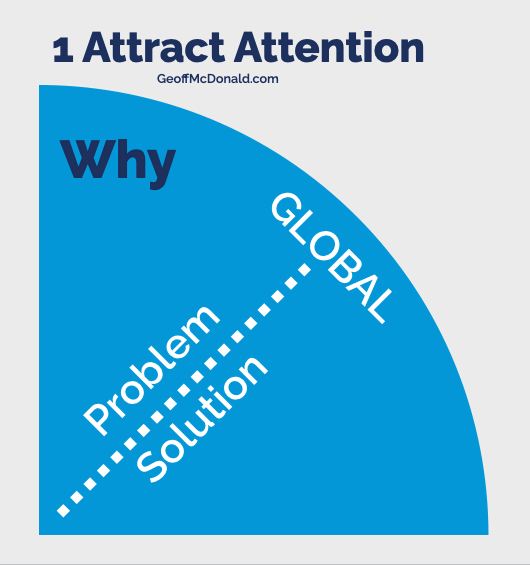 1 Why should you care?
1 Why should you care?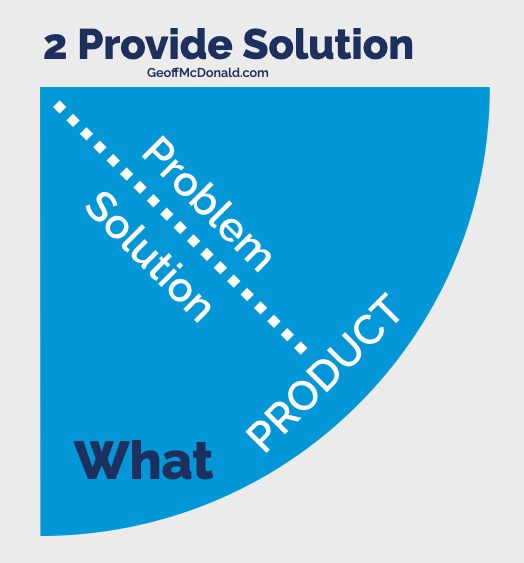 2 What is Your Product Solution?
2 What is Your Product Solution?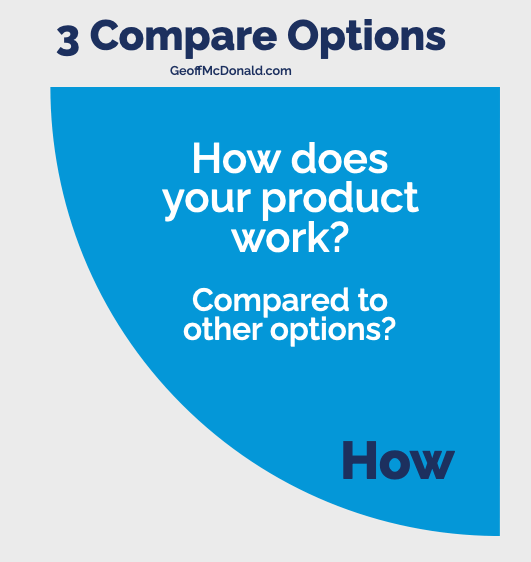 3 How does it work?
3 How does it work?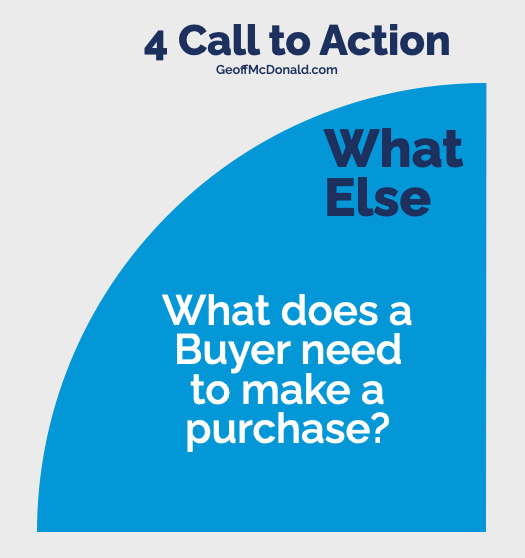 4 What Else do I need to buy?
4 What Else do I need to buy?